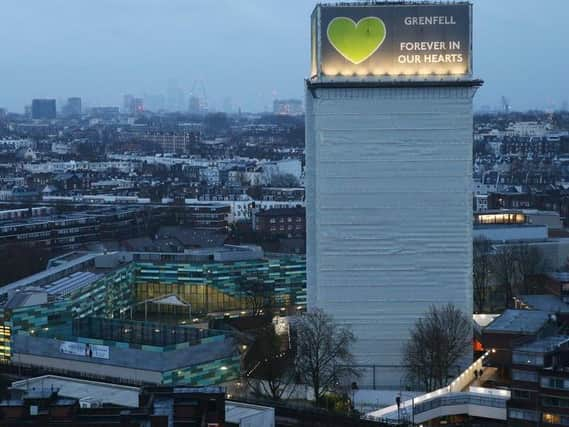Yorkshire leaseholders still facing cladding costs 'nightmare' four years after Grenfell Tower disaster, MP says


A Leeds MP has said more still needs to be done to protect leaseholders from the “nightmare” of unsafe cladding, on the eve of the fourth anniversary of the Grenfell Tower disaster.
Leeds Central MP Hilary Benn (Lab) says that despite moves from the Government earlier this year to protect the leaseholders of flats, thousands are still faced with the crippling costs of replacing potentially flammable cladding on the sides of their homes.
Advertisement
Hide AdAdvertisement
Hide AdHe added, however, that a growing number of MPs from Prime Minister Boris Johnson’s own party were beginning to side with campaigners calling for the Government to force developers to foot the bill when it comes to making their constructions safe.
Mr Benn said: “Four years on from Grenfell – a terrible tragedy – there are thousands of people in Leeds and Yorkshire living in buildings with dangerous cladding.
“They are paying for waking watches, some of them are getting demands for payment. Their flats are worthless, they haven’t got the money and they are in no way responsible for the situation.”
In the case of most flats, the owner buys a lease on their individual home for a certain number of years. The building itself – known as the freehold – is often owned by a landlord or management company, which can collect fees from leaseholders for maintenance and upkeep of the building.
Advertisement
Hide AdAdvertisement
Hide AdSince Mr Benn and campaigners called for more help back in January, housing secretary Robert Jenrick said the Government would fully fund the leaseholder costs of replacing unsafe cladding in residential buildings in England that are taller than 18 metres – around six storeys.
In a statement in February, Mr Jenrick added that leaseholders in lower-rise buildings would be offered long-term, low interest, government-backed loans to replace cladding.
But Mr Benn said he believes the Government has not gone far enough, adding: “The Government has helped fix half of the problem. You can’t make a building half safe.
“Leaseholders shouldn’t have to pay anything, but another problem is that loads of these buildings, when they have taken off the outside and started to peer inside, they have discovered other problems, like missing fire breaks, flammable insulation and wooden balconies.
Advertisement
Hide AdAdvertisement
Hide Ad“Who is going to pay to fix all of those things? Leaseholders still don’t have the money. Their flats are worthless, they can’t borrow against them.
“It is shocking that four years after Grenfell, so many innocent leaseholders are still in this position.
“The Government should come forward and put money up to fix all of these problems and then seek to recover the costs from the freeholders, developers and the building industry in general.
“There are some buildings where they are getting on with replacing the cladding – in some cases developers have accepted responsibility or insurers are paying up.
Advertisement
Hide AdAdvertisement
Hide Ad“But there are still a lot of people in a terrible hole not of their own making.”
Mr Benn said developers building high rise residential blocks without proper fire safety breaks would usually be open to legal action, but this often is too difficult for leaseholders to pursue.
He said: “The problem is, are they still around to be sued? Leaseholders don’t have the money to sue anybody and it takes years – people don’t have years. They are paid extra costs.”
It is believed amendments are set to be proposed for the upcoming Building Safety Bill, in order to set in law the principle that leaseholders should not have to pay for replacement cladding.
Advertisement
Hide AdAdvertisement
Hide AdMr Benn claimed a growing number of MPs from all parties were beginning to side with leaseholders on the issue.
“There is a growing number of Conservative MPs who are supporting the campaign,” he said. “The Government is under pressure, but we haven’t yet got a majority to say leaseholders aren’t going to pay.”
Back in February, the Housing Secretary also announced plans to introduce a developer levy, which would apply when developers seek permission to develop certain high-rise buildings in England.
He also announced a new tax to be introduced to raise at least £2bn over a decade to help pay for cladding remediation costs.
Advertisement
Hide AdAdvertisement
Hide AdMr Jenrick said: “The tax will ensure that the largest property developers make a fair contribution to the remediation programme, reflecting the benefit they will derive from restoring confidence to the UK housing market. The Government will consult on the policy design in due course.
“The Government will protect future generations from similar mistakes by bringing forward legislation this year to tighten the regulation of building safety and to review the construction products regime to prevent malpractice arising again.”